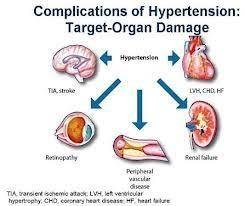
The term hypertension is used to describe blood pressure that is sustained at a higher than the 'normal' maximum level for a particular age group, e.g., at 20 years 140/90 mmHg, at 75 years 170/105 mmHg.
CHANGES IN THE BLOOD VESSELS IN HYPERTENSION
At first the amount of muscle and elastic tissue in the walls of the arteries increases. Later it is replaced by fibrous tissue. The walls of small and medium arteries become thick, hard and inflexible (arteriosclerotic) and the lumen is reduced but large arteries lose their elasticity and dilate. When elasticity is lost smooth blood flow changes to pulsating flow i.e., there are fluctuations in blood pressure in the arteries that reflect the pressure difference between cardiac systole and diastole. At bends and bifurcations in small arteries there is a tendency for platelets and fibrin to be deposited, increasing the risk of thrombosis. Aneurysms tend to form in ce lebral arteries and when the pressure continue to rise there may rupture, especially elderly people (celebrovascular accident) partchy changes in blood vessel walls are more common in the spleen, liver, kidney and pancreas.
Senile ateroclorosis is a condition affecting elderly people in which the progressive loss of elasticity and reduced lumen leads to celebral ischemia and loss of function. There may or may not be evidence of hypertension. Hypertension is described as essential, (primary, ideopatic) or secondary to other diseases.
ESSENTIAL HYPERTENSION

This means hypertension of unknown cause. It accounts for 85 to 90% of all cases and it's sub divided according to the rate at which the disease progress.
BENIGN OR CHRONIC HYPERTENSION
The rise in pressure is usually slight to moderate and continues to rise slowly. Sometimes complications are the first indication of hypertension, e.g., heart, cerebrovascular accident, myocardial infarction. Occasionally the rate of pressure increases and the hypertension becomes malignant.
MALIGNANT (ACCELERATED) HYPERTENSION
The blood pressure is very high and continue to rise rapidly. Diastolic pressure in excess of 120 mmHg is common. The effect quickly becomes apparent, e.g,. heamorrhages into the retina, papiloedema (oedema around the optic disc), encephalopathy (celebral irritation), renal failure.
SECONDARY HYPERTENSION

Hypertension resulting from other disease account for 10 to 15% of all cases.
KIDNEY DISEASES
Raised blood pressure is a complication of many kidney diseases. The vasoconstrictor effect of excess renin release by damaged kidneys is one causative factor but they may be others, as yet unknown.
ADRENAL CORTEX DISEASES
Secretion of excess aldesterone and cortisol stimulate the retention of excess sodium and water by the kidneys, raising the blood volume and pressure. Oversecretion of aldestetone is due to a hormone secreting tumour. Oversecretion of vortisol may be due to over stimulation of the gland by adrenocorticostrophic hormone secreted by the pituitary gland, or to a hormone secreting tumour.
STRUCTURE OF THR AORTA
Hypertension developes in branching arteries proximal to a site of a stricture. In congenital voarctation the stricture is between the ductus arteriosus and the left subelavian artery causing hypertension in the bead, neck and right arm. Compression of the arota by an adjacent tumour may cause hypertension proximal to the stricture.
EFFECT OF HYPERTENSION

The effects of long standing and progressively rising blood pressure are best considered in relation to hypertension, as it is not associated with other diseases.
HEART
The rate and force of cardiac contraction is increased to maintain the cardiac output against a sustained rise in arterial pressure. The left ventricle hypertrophies and begin to fall when compensation has reached it limit. This is followed by stasis of blood in the lungs, hypertrophy of the right ventricle and eventually to right ventricular failure.
BRAIN
Cerebral hemorrhage is common, the effect depending on the position and site of the raptured vessels. When a series of small blood vessels rupture at different times there is progressive disability. Rupture of a large vessels cause extensive loss of function or possible death.
KIDNEYS
Essential hypertension causes kidney damage. If sustained for only a short time recovery may be complete. Otherwise the kidney damage cause further hypertension, progressive loss of kidney function and kidney failure.
PULMONARY HYPERTENSION
Raised blood pressure in the pulmonary circulation is secondary to;
Changes in blood vessels, described above
Diseases of the respiratory system
Diseases of the heart, e.g., congenital defect of the septum, stenosis and incompetence of the mitral or aortic valve.
Diseases of other organs that cause raised pressure in the left side of the heart, e.g., cirrhosis of the liver, thrombosis of the vein.



Congratulations! This post has been upvoted from the communal account, @minnowsupport, by Fidelmboro from the Minnow Support Project. It's a witness project run by aggroed, ausbitbank, teamsteem, theprophet0, someguy123, neoxian, followbtcnews, and netuoso. The goal is to help Steemit grow by supporting Minnows. Please find us at the Peace, Abundance, and Liberty Network (PALnet) Discord Channel. It's a completely public and open space to all members of the Steemit community who voluntarily choose to be there.
If you would like to delegate to the Minnow Support Project you can do so by clicking on the following links: 50SP, 100SP, 250SP, 500SP, 1000SP, 5000SP.
Be sure to leave at least 50SP undelegated on your account.
👍
This post has received a 0.15 % upvote from @drotto thanks to: @banjo.
👍
Have followed you
Have u written all this by own...? Or google?
Nice and informative👍
Have you forgotten @cheeteh the God of copyright is still in existence ?
He is still at work man!
If it's not from me he will certainly know.
Thank you for your comment
Have followed you @steemflow
informative ..
Thank you @bobinson
I have followed you
Spamfinderbot found a series of multi accounts of a same owner is following your articles to cheat your generous rewards.
Spamfid these accounts are suspicious & can be multi accounts of a single owner. Conclusion is based on last 30 days transactions
@o07
@fidelmboro
https://steemit.com/contest/@durgaani/wimners-declered-and-6-sbd-send-to-their-accounts
https://steemit.com/contest/@durgaani/wimners-declered-and-6-sbd-send-to-their-accounts
Sorry for late sending of your winning amount bro..enjoi the day..
This is awesome
Thank you
Great ideas for the people around us
Thank you
Wow. This is loaded with great Information
I'm grateful
Nice one bro
Thank you sir
This is very informative....
Thanks for sharing
Thank you for your comments